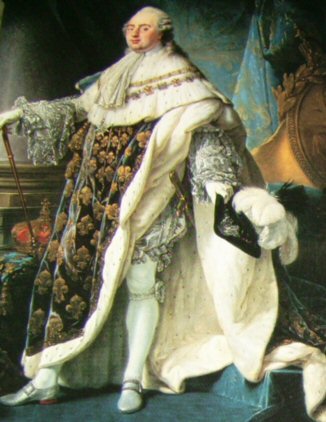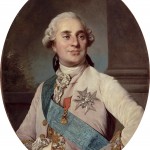King Louis XVI
This content was created/compiled by Joey Moloney.

Louis XVI
______________________________________________________________________________________________________________
In Brief:
Louis XVI of France (23 August 1754 – 21 January 1793) ruled as King of France and Navarre from 1774 until 1791, and then as King of the French from 1791 to 1792. Although Louis was beloved at first, he was indecisive and was reluctant to accept change and this led some elements of the people of France to eventually view him as a symbol of the perceived tyranny of the Ancien Régime. He was found guilty of treason, and executed by guillotine on 21 January 1793. He was the only king of France to be executed.
[youtube]http://www.youtube.com/watch?v=2CbxmxyW9CQ&feature=related[/youtube]
EARLY LIFE
Louis-Auguste de France, who was given the title of duc de Berry at birth, was born in the Palace of Versailles in France. Out of eight children, he was the third son of the Dauphin Louis-Ferdinand, and thus the grandson of Louis XV of France. Louis-Auguste had a difficult childhood because his parents neglected him in favor of his bright and handsome older brother, Louis, duc de Bourgogne, who died at the age of ten in 1761. A strong and healthy boy, although very shy, Louis-Auguste excelled in his studies and had a strong taste for Latin, history, geography, and astronomy, and became fluent in Italian and English. He enjoyed manual activities such as hunting with his grandfather, Louis XV, and rough-playing with his younger brothers. From an early age, Louis-Auguste had been encouraged in another of his hobbies: locksmithing, which was seen as a ‘useful’ pursuit for a child.
Upon the death of his father, who died of tuberculosis on 20 December 1765, the eleven-year-old Louis-Auguste became the new Dauphin. His mother, who had never recovered from the loss of her husband, died on 13 March 1767, also from tuberculosis. The strict and conservative education he received from the duc de La Vauguyon, “gouverneur des Enfants de France” (governor of the Children of France) from 1760 until his marriage in 1770 did not prepare him for the throne he was to inherit in 1774 at the death of his grandfather.
FAMILY LIFE
On 16 May 1770, at the age of sixteen, Louis-Auguste married the 14-year-old Habsburg Archduchess Maria Antoinette, his second cousin once removed. The marriage was met with hostility by the French public. France’s alliance with Austria had pulled France into the disastrous Seven Years War, in which they were soundly defeated by the British. By the time Louis-Auguste and Marie-Antoinette were married, the people of France regarded the Austrian alliance with intense dislike, and Marie-Antoinette was seen as an unwelcome foreigner. For the young couple, the marriage was initially amiable but distant — Louis-Auguste’s shyness meant that he failed to consummate the union, much to his wife’s distress, whilst his fear of being manipulated by her for Imperial purposes caused him to behave coldly towards her in public. Over time, the couple became closer, and the marriage was consummated in July 1773.
Nonetheless, the couple failed to produce children for several years after that, placing strain upon the marriage, whilst the situation was worsened by the publication of obscene pamphlets (libelles) which mocked the infertility of the pair. One questioned, “Can the King do it? Can’t the King do it?”
The Royal couple had four children:
- Marie-Thérèse-Charlotte (19 December 1778 – 19 October 1851)
- Louis-Joseph-Xavier-François (22 October 1781 – 4 June 1789)
- Louis-Charles (the future titular King Louis XVII of France) (27 March 1785 – 8 June 1795)
- Sophie-Hélène-Béatrix (9 July 1786 – 19 June 1787)
ABSOLUTE MONARCHY OF FRANCE 1774 TO 1789
When Louis XVI succeeded to the throne in 1774, he was 20. He had an enormous responsibility, as the government was deeply in debt, and resentment towards ‘despotic’ monarchy was on the rise. Louis also felt woefully unqualified for the job. He aimed to earn the love of his people by reinstating the parlements. While none doubted Louis’ intellectual ability to rule France, it was quite clear that, although raised as the Dauphin since 1765, he was indecisive and not firm enough to rule. In spite of his indecisiveness, Louis was determined to be a good king, stating that he “must always consult public opinion; it is never wrong.” Louis therefore appointed an experienced advisor, Jean-Frédéric Phélypeaux, comte de Maurepas who, until his death in 1781, would take charge on many important ministerial decisions.
As power drifted from him, there were increasingly loud calls for him to convoke the Estates-General, and in May 1789 he did so, summoning it for the first time since 1614 in a last-ditch attempt to get new monetary reforms approved. With the convocation of the Estates-General, as in many other instances during his reign, Louis placed his reputation and public image in the hands of those who were perhaps not as sensitive to the desires of the French public as he was. Because it had been so long since the Estates-General had been convened, there was some debate as to which procedures should be followed. Ultimately, the parliament of Paris agreed that “all traditional observances should be carefully maintained to avoid the impression that the Estates-General could make things up as it went along.” Under this decision, the King agreed to retain many of the divisionary customs which had been the norm in 1614, but which were intolerable to a Third Estate buoyed by the recent proclamations of equality. For example, the First and Second Estates proceeded into the assembly wearing their finest garments, while the Third Estate was required to wear plain, oppressively somber black, an act of alienation that Louis would likely have not condoned. He seemed to regard the deputies of the Estates-General with at least respect: in a wave of self-important patriotism, members of the Estates refused to remove their hats in the King’s presence, so Louis removed his to them.
FOREIGN POLICY
French involvement in the seven years war had left Louis XVI a disastrous inheritance. Britain’s victories had seen them capture most of France’s colonial territories. While some were returned to France at the 1763 Treaty of Paris a vast swathe of North America was ceded to the British.
This had led to a strategy amongst the French leadership of seeking to rebuild the French military in order to fight a war of revenge against Britain, in which it was hoped the lost colonies could be recovered. France still maintained a strong influence in the West Indies, and in India maintained five trading posts, leaving opportunities for disputes and power-play with Great Britain.
ARREST AND EXECUTION 1792 TO 1793
Louis was officially arrested on the 13th of August and sent to the Temple, an ancient Paris fortress used as a prison. On 21 September, the National Assembly declared France to be a republic and abolished the monarchy.
The Girondins were partial to keeping the deposed king under arrest, both as a hostage and a guarantee for the future. The more radical members – mainly the Commune and Parisian deputies who would soon be known as the Mountain – argued for Louis’s immediate execution. The legal background of many of the deputies made it difficult for a great number of them to accept an execution without due process of some sort, and it was voted that the deposed monarch should be tried before the National Convention.
On 11 December, among crowded and silent streets, the deposed king was brought from the Temple to stand before the Convention and hear his indictment, an accusation of High Treason and Crimes against the State.
The next day, a motion to grant Louis reprieve from the death sentence was voted down; 310 deputies requested mercy, 380 voted for the execution of the death penalty. This decision would be final. On Monday, 21 January 1793, stripped of all titles and honorifics by the republican government, Citoyen Louis Capet was guillotined in front of a cheering crowd in what today is the Place de la Concorde.
As Louis mounted the scaffold he appeared dignified and resigned. He attempted a speech in which he reasserted his innocence and pardoned those responsible for his death. He declared himself willing to die and prayed that the people of France would be spared a similar fate. He seemed about to say more when Antoine-Joseph Santerre, a general in the National Guard, cut Louis off by ordering a drum roll. The former king was then quickly beheaded.
Accounts of Louis’s beheading indicate that the blade did not sever his neck entirely the first time. There are also accounts of a blood-curdling scream issuing from Louis after the blade fell but this is unlikely as the blade severed Louis’s spine. It is agreed however that, as Louis’s blood dripped to the ground, many in the crowd ran forward to dip their handkerchiefs in it.
____________________________________________________________________________________________________________
_____________________________________________________________________________________________________________
MAIN DATES
- 1754-BORN
- 1774-BECAME KING
- 1761-OLDER BROTHER LOUIS DUC DE BOURGOGNE DIED
- 1765-FATHER’S DEATH
- 1767-MOTHER’S DEATH
- 1760-BECAME THE GOVERNOR OF THE CHILDREN OF FRANCE
- 1770-GOT MARRIED
- 1778- BIRTH OF FIRST CHILD
- 1781-BIRTH OF SECOND CHILD
- 1785-BIRTH OF THIRD CHILD
- 1786-BIRTH OF FOURTH CHILD
- 1791-RESIGNED FROM BEING KING
- 1793-EXECUTED BY GUILLOTINE
_____________________________________________________________________________________________________________
USEFUL LINKS
BBC History-King Louis The XVI
_____________________________________________________________________________________________________________
[youtube]http://www.youtube.com/watch?v=8VCfK1OLwM0&feature=PlayList&p=0120EFE6EDF985AA&playnext_from=PL&playnext=1&index=1[/youtube]
______________________________________________________________________________________________________________
History@Banagher College, Coláiste na Sionna.
The URI to TrackBack this entry is: http://teachnet.eu/tobrien/about/revolutions/the-french-revolution/king-louis-xvi/trackback/
3 Comments Leave a comment.
Leave a Comment
You must be logged in to post a comment.



i did’nt know louis had an older brother
very well laid out.
I didn’t know both his parents died from TB! :O. I heard somewhere that Louis only had a bath 3 times in his life!